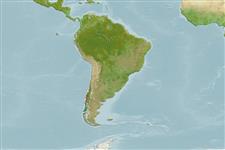Myxini (миксины) (hagfishes) >
Myxiniformes (Hagfishes) >
Myxinidae (Hagfishes) > Eptatretinae
Etymology: Eptatretus: hepta (Gr.), seven; tretos (Gr.), perforated (i.e., with holes), referring to seven gill apertures on what would later be described as Homea banksii (=E. cirrhatus) [range within genus is 6-14 pairs of gill apertures] (See ETYFish); polytrema: poly- (Gr.), many; trema (Gr.), hole, referring to 16 gill apertures per side (See ETYFish).
More on author: Girard.
Environment: milieu / climate zone / depth range / distribution range
экология
морской демерсальный; немигрирующий; пределы глубины 10 - 350 m (Ref. 31276). Deep-water; 30°S - 42°S
Southeast Pacific: Chile (from Coquimbo to Puerto Montt, Ref. 34263).
Size / Вес / Возраст
Maturity: Lm ? range ? - ? cm
Max length : 93.0 cm TL самец/пол неопределен; (Ref. 31276)
TBK: demerspelag.
Life cycle and mating behavior
половая зрелость | размножение | нерест | икра | Fecundity | личинки
Copulatory organ absent. The gonads of hagfishes are situated in the peritoneal cavity. The ovary is found in the anterior portion of the gonad, and the testis is found in the posterior part. The animal becomes female if the cranial part of the gonad develops or male if the caudal part undergoes differentiation. If none develops, then the animal becomes sterile. If both anterior and posterior parts develop, then the animal becomes a functional hermaphrodite. However, hermaphroditism being characterised as functional needs to be validated by more reproduction studies (Ref. 51361 ).
Fernholm, B., 1998. Hagfish systematics. p. 33-44. In J.M. Jørgensen, J.P. Lomholt, R.E. Weber and H. Malte (eds.) The biology of hagfishes. Chapman & Hall, London. 578 p. (Ref. 31276)
Статус Красного Списка МСОП (Ref. 130435: Version 2024-1)
Угроза для людей
Harmless
Использование человеком
рыболовство: интереса не представляет
дополнительная информация
инструменты
Специальные отчеты
Скачать в формате XML
ресурсы в Интернет
Estimates based on models
Preferred temperature (Ref.
123201): 10.5 - 11.8, mean 11.1 °C (based on 8 cells).
Phylogenetic diversity index (Ref.
82804): PD
50 = 0.5000 [Uniqueness, from 0.5 = low to 2.0 = high].
Bayesian length-weight: a=0.00389 (0.00211 - 0.00719), b=2.92 (2.74 - 3.10), in cm total length, based on LWR estimates for this species & (Sub)family-body (Ref.
93245).
Trophic level (Ref.
69278): 4.4 ±0.7 se; based on size and trophs of closest relatives
Generation time: 8.9 ( na - na) years. Estimated as median ln(3)/K based on 1
growth studies.
устойчивость к внешним воздействиям (Ref.
120179): низкий, минимальное время удвоения популяции 4.5-14 лет (Fec assumed to be <100).
Fishing Vulnerability (Ref.
59153): High vulnerability (62 of 100).
Nutrients (Ref.
124155): Calcium = 10.4 [2.7, 33.2] mg/100g; Iron = 0.333 [0.119, 0.906] mg/100g; Protein = 2.72 [0.00, 6.54] %; Omega3 = 0.259 [0.101, 0.676] g/100g; Selenium = 13.2 [3.9, 44.3] μg/100g; VitaminA = 9.6 [2.0, 44.9] μg/100g; Zinc = 0.307 [0.153, 0.589] mg/100g (wet weight);
